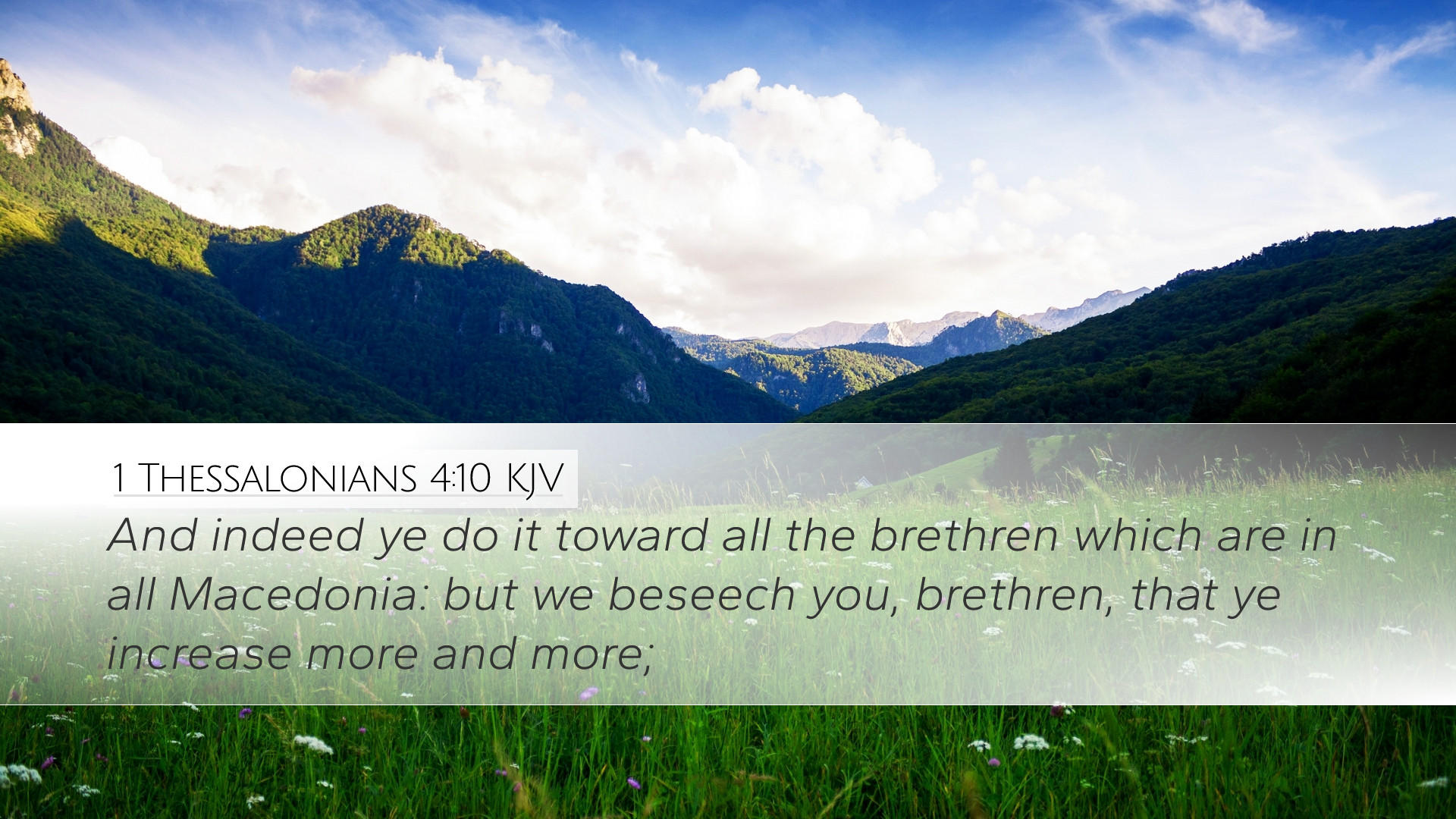Commentary on 1 Thessalonians 4:10
1 Thessalonians 4:10 states: "And indeed you do it toward all the brethren who are in all Macedonia. But we urge you, brethren, that you increase more and more."
Overview
This verse reflects the Apostle Paul's commendation of the Thessalonian believers for their love and charity towards fellow Christians, specifically those in Macedonia. This commentary synthesizes insights from renowned public domain commentaries, offering a meaningful exploration for pastors, students, theologians, and Bible scholars.
Contextual Analysis
The context of this verse lies within a larger exhortation concerning Christian living and ethics. Paul expresses gratitude for the Thessalonian church’s progress in faith and love, affirming their actions while urging them to continue growing in these virtues.
Commendation of Charity
Matthew Henry notes that Paul begins this section with a commendation of the Thessalonians’ charitable acts. This commendation serves to recognize their already visible love for the brethren.
Henry emphasizes that the church's love was not limited to its immediate members but extended throughout Macedonia, demonstrating the church's vitality and reach. In this regard, he argues that genuine love for Christians is a vital sign of true faith.
The Call to Increase
Following this commendation, Paul urges them to “increase more and more”. Albert Barnes elucidates that this phrase indicates not an end to their charitable works, but an ongoing necessity to grow in this aspect of their Christian life. The failure to continue to cultivate their love would lead stagnation or regression in their spiritual journey.
Barnes remarks that love is a defining characteristic of the Christian faith, one that ought to be progressively developed throughout a believer's life. He points out that the call to increase is a reminder that love should know no bounds and that believers ought to continually strive to expand their charitable hearts and actions.
Spiritual Growth
Adam Clarke highlights that Paul's encouragement not only seeks to affirm their current state but also imparts a vision for continual growth. Clarke states that spiritual progress is expected of all believers, and the notion of "more and more" suggests that the life of a Christian is a journey toward ever-increasing holiness and love.
Clarke further suggests that this growth is not merely a human endeavor; rather, it is strengthened and enabled by the Holy Spirit's work within them.
Theological Implications
The implications of this verse are profound for contemporary Christian communities. The Thessalonian ethos of love showcases the importance of community and communal service, which should resonate within church environments today.
- Community Building: The call to love should encourage churches to foster environments that nurture relational depth and support among their members.
- Charity as a Witness: The external expression of love and charity can serve as a powerful witness to the surrounding world about the nature of Christ.
- Continuous Growth: The challenge to grow signifies that stagnation is contrary to the essence of Christian life; believers are to pursue maturity in faith and action.
Practical Applications
As confirmed by these commentaries, several practical applications emerge from this text for today's believers:
- Embrace Opportunities for Service: Believers should actively seek ways to extend love and support beyond their local church to the broader community.
- Encourage One Another: Communities should intentionally encourage practices of love amongst members through organized activities and supportive relationships.
- Reflect on Personal Growth: Individuals should take stock of their spiritual journeys and identify areas for increased love and charity in their daily lives.
Conclusion
1 Thessalonians 4:10 stands as an exhortation for believers to recognize and amplify their love within the body of Christ. The insights from Matthew Henry, Albert Barnes, and Adam Clarke reinforce the importance of love as a distinguishing feature of Christian faith and life. Just as Paul challenged the Thessalonians, contemporary believers are called to not only validate their faith through love but to actively cultivate and grow in it.


